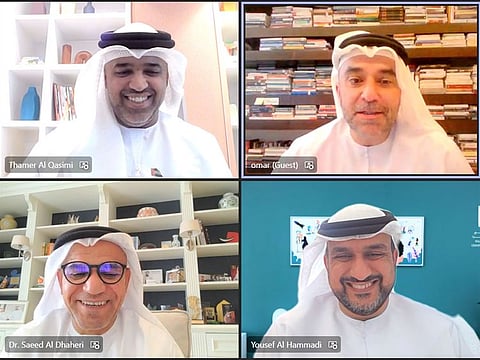Abu Dhabi’s WED Movement explores positive learning through technology
'How can we make kids smarter, kinder, healthier?' ask members

Teacher and guide, play area for the mind – there’s so much tech can offer the children of today. It’s the how of exposure that poses the biggest conundrum for parents.
At a recently held World Early Childhood Development Movement (WED Movement) session, Omar Saif Ghobash, UAE Assistant Minister for Cultural Affairs and Co-Chair of WED Movement Breakthrough Working Groups, said: “Technology is a part of our lives and our children are already in the digital space at a very young age. We have a tremendous opportunity to drive change in technology design and media content in ways parents simply can’t do themselves that will directly benefit the healthy development of young children.”
The WED Movement, which was launched recently by Early Childhood Authority (ECA) under the patronage of Sheikh Theyab bin Mohamed bin Zayed Al Nahyan, Chairman of Abu Dhabi Crown Prince Court and Chairman of the Abu Dhabi Early Childhood Authority (ECA), was attended by Dr Saeed Al Dhaheri, Tech Humanity for Children team member and Chairman of Smartworld; and Dr Yousef Al Hammadi, ECA Executive Director, Knowledge & Impact Sector.
Dr Al Dhaheri said: “We want to look at technology through a public health lens for what it offers our children as opposed to viewing screens as toxic and guilting parents for allowing their children to use technology. To that end, we are assessing all aspects of technology use in and out of the home as well as interaction of parents and children together with technology. We are committed to using the knowledge and experience of this team to drive innovation that can help our children grow up healthier, smarter and learn to be kinder to each other.”
The group, members of which have worked with from tech and corporate leaders such as Google, IKEA, Microsoft, Apple and Intel Labs, the Tech Humanity for Children team is finding solutions to promote positive digital literacy and learning experiences for children. One objective of the group is to find ways to incentivise companies to develop child-centric apps and content.
The group also analysing and assessing a number of challenges the growing use of technology with young children presents. That includes looking at the impact of the pandemic on increased screen time, child privacy and protection, online bullying, and technology access, affordability and use among marginalised populations. It is also assessing the potential value and impact of technology use among children of determination.
In addition to analysing existing research and data, the Tech Humanity for Children group is conducting original research on technology use and habits among Abu Dhabi children that will influence their work.
Dr Al Hammadi said at the meeting: “Technology can be a powerful tool to help our children learn and grow. We can help parents learn how to better enter the digital space together with their children for a shared learning and play experience. We can show them how technology can help our children to be aspirational, nurture their creativity, and learn how to express themselves in an authentic and kind way. But our parents need access to credible, trusted resources and evidence about their children’s involvement in the digital space”.
By capturing the experience and insights of child health professionals, academics and educators, researchers, technology, media and design experts, WED Movement will develop and present a series of actionable policies and programmes that can be immediately implemented by ECA to benefit children across the emirate.


